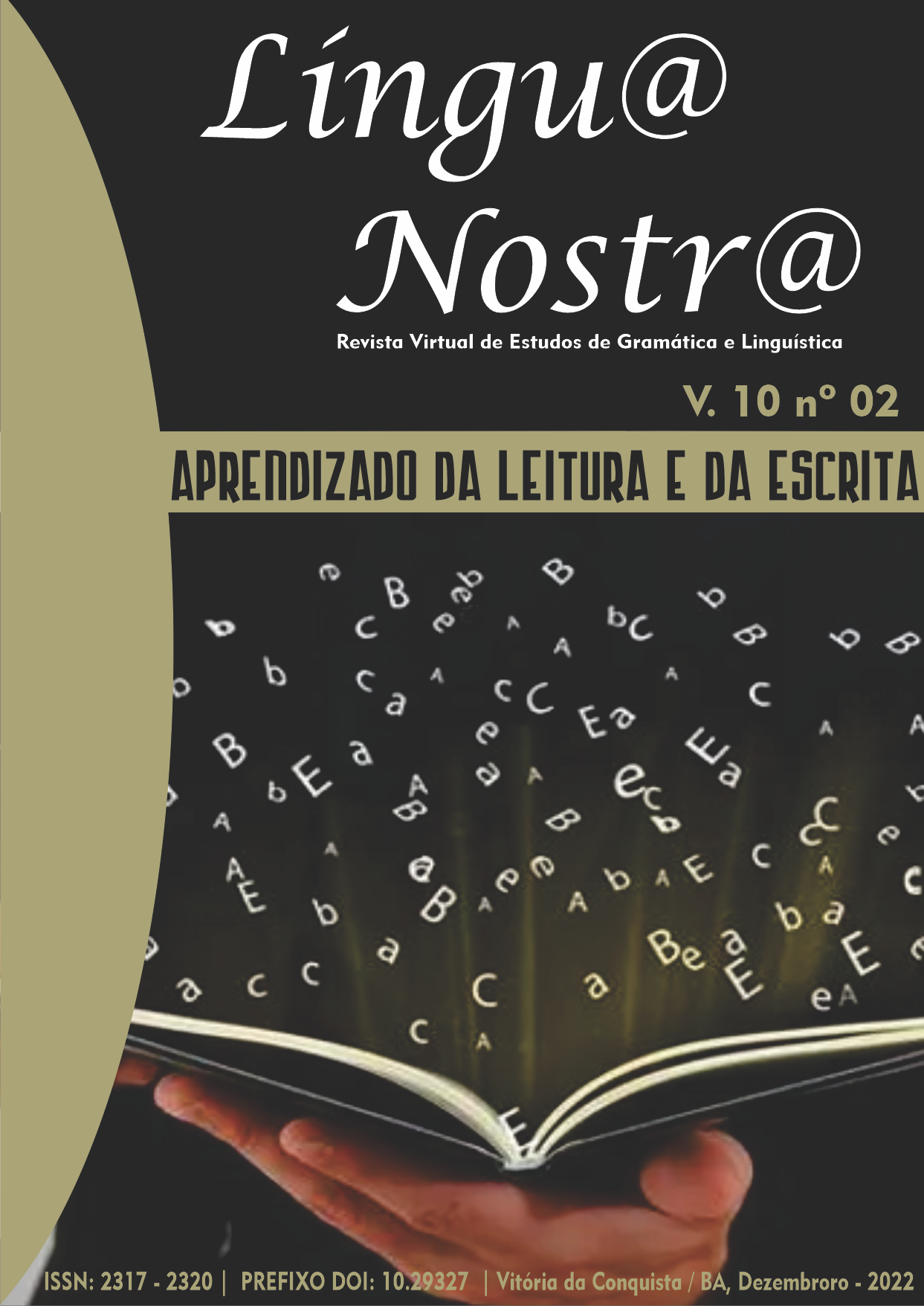Os gêneros do discurso e a leitura em meio digital: o texto e o leitor em movimento
DOI:
https://doi.org/10.29327/232521.9.1-28Keywords:
Gêneros do discurso, Leitura, Leitor, Literacia digitalAbstract
In view of the advent of digital tools for reading and communication, we propose a brief discussion on how discourse genres have been modified by new ways of reading, which include digital supports, discursive presentation formats, modes of reader interaction with the text and organization of the utterance in space-time. For this, we start from notions about textual genres from the dialogical theory of the Bakhtin Circle. We followed the discussion by drawing up a dialogue with researchers in the fields of psycholinguistics and neurolinguistics, in order to verify which cognitive skills are involved in reading that can follow the trend in current changes in the way we read and process reading in print and in digital medium. Aspects such as brain plasticity and attentional refinement are presented as possible mechanisms that may be strongly influenced by digital reading modes. At the same time, there is an inevitable trend towards digitizing data, so that information follows the pace of today's society, in a fluid, accessible and fast way. In view of this perspective, we sought to balance positions, presenting positive and negative aspects of this change, so that the balance between the need to maintain the implementation of digital technology in encouraging reading, and the maintenance of the cognitive demand reaches a measure the as close as possible to a healthy habit. We believe that this is a relatively recent phenomenon that requires careful long-term scientific observation, as it is growing and definitive, following the evolution of human behavior and the advancement of digital technologies.
Downloads
References
ARAÚJO, J. C.R. de. Transmutação de gêneros na web: a emergência do chat. In: L. A. Marcuschi e A. C. Xavier. Hipertexto e gêneros digitais: novas formas de construção de sentido. São Paulo: Cortez, 2010.
BAKHTIN, M. Os Gêneros do discurso. Trad. Paulo Bezerra. São Paulo: Editora 34, 2016.
BARON, N. Know what? How digital technologies undermine learning and remembering. Journal of Pragmatics, 175, 2021, p. 27-37.
BUCHWEITZ, A. et al. Das primeiras palavras à aprendizagem da leitura. In: Lent, R., Buchweitz, A., Mota, M. B. Ciência para educação: uma ponte entre dois mundos. São Paulo: Editora Atheneu, 2018.
CARR, N. The shallows: what the internet is doing to our brains. New York: Norton & Company, 2010.
COSCARELLI, C. V. Alfabetização e letramento digital. In: C. V. Coscarelli e A. E. Ribeiro. Letramento digital: aspectos sociais e possibilidades pedagógicas. 3 ed. Belo Horizonte: Ceale; Autêntica, 2021.
COSENZA, R. M., GUERRA, L.B. Neurociência e educação: como o cérebro aprende. Porto Alegre: Artmed, 2011.
DELGADO, P.; SALMERÓN, L. The inattentive on-screen reading: Reading medium affects attention and reading comprehension under time pressure. Learning and Instruction, 71, 2021.
DUDENEY, G. et al. Letramentos digitais. Trad. Marcos Marcionilo. São Paulo: Parábola Editorial, 2016.
GOULART, C. Letramento e novas tecnologias: questões para a prática pedagógica. In: C. V. Coscarelli e A. E. Ribeiro. Letramento digital: aspectos sociais e possibilidades pedagógicas. 3 ed. Belo Horizonte: Ceale; Autêntica, 2021.
HARTMAN, D.K. et al. From Print to Pixels: The Evolution of Cognitive Conceptions of Reading Comprehension. In: Baker, E. A. The new literacies: Multiple Perspectives on Research and Practice. New York: The Guilford Press, 2010.
HORNING, A. S. Reading, Writing, Digitizing: Understanding Literacy in the Electronic Age. Cambridge Scholars Publishing, 2012.
LENT, R. O cérebro aprendiz: neuroplasticidade e educação. Rio de Janeiro: Atheneu, 2019.
MAINGUENEAU, D. Discurso e análise do discurso. Trad. Sírio Possenti. São Paulo: Parábola Editorial, 2015.
MARCUSCHI, L. A. Produção textual, análise de gêneros e compreensão. São Paulo: Parábola Editorial, 2008.
MARCUSCHI, L.A. Gêneros textuais emergentes no contexto da tecnologia digital. In: L. A. Marcuschi e A. C. Xavier. Hipertexto e gêneros digitais: novas formas de construção de sentido. São Paulo: Cortez, 2010.
MARCUSCHI L.A. Linguística de texto: o que é e como se faz? São Paulo: Parábola Editorial, 2012.
MEDVIÉDEV, P. N. O método formal nos estudos literários: introdução a uma poética sociológica. Trad. Ekaterina V. Américo e Sheila C. Grillo. São Paulo: Editora Contexto, 2010.
NUNES, J. DA S. Leitura Híbrida: propostas de práticas sociais de letramento digital. 1 ed. São Paulo: Artesanato Educacional, 2018.
OLIVEIRA, R. M. e LENT, R. O Desenvolvimento da Mente Humana. In: Lent, R., Buchweitz, A., Mota, M. B. Ciência para educação: uma ponte entre dois mundos. São Paulo: Editora Atheneu, 2018.
PERDEW, L. Information literacy in the digital age. Abdo Publishing, 2017.
PEREIRA, J. T. Educação e sociedade da Informação. In: C. V. Coscarelli e A. E. Ribeiro. Letramento digital: aspectos sociais e possibilidades pedagógicas. 3 ed. Belo Horizonte: Ceale; Autêntica, 2021.
PONZIO, L. Visões do Texto. Trad. Mary Elizabeth Cerutti-Rizzatti e Giorgia Brazzarola. São Carlos: Pedro & João editores, 2017.
TOVAR-MOLL, F., LENT, R. Neuroplasticidade. In: Lent, R., Buchweitz, A., Mota, M. B. Ciência para educação: uma ponte entre dois mundos. São Paulo: Editora Atheneu, 2018.
TRACEY, D. H. et al. Cognitive Processing Perspectives on the New Literacies. In: Baker, E. A. The new literacies: Multiple Perspectives on Research and Practice. New York: The Guilford Press, 2010.
WOLF, M. O cérebro no mundo digital: os desafios da leitura na nossa era. Trad. Rodolfo Ilari, Mayumi Ilari. São Paulo: Contexto, 2019.
Downloads
Published
How to Cite
Issue
Section
License
Copyright (c) 2023 Língu@ Nostr@

This work is licensed under a Creative Commons Attribution 4.0 International License.






